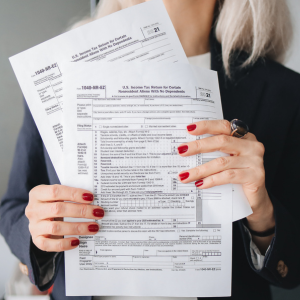
Understanding Capital Gains Tax on Real Estate Sales in Ohio
Understanding how the capital gains tax works concerning real estate transactions is essential when selling a home in Ohio. A capital gains tax is charged when a property is disposed of at a price above its purchase cost.
Here in Ohio, federal taxes are likely to impact your net proceeds. To get your capital gain, determine the basis of the property, which is generally the purchase price and any additional value added through further improvements.
The difference between this adjusted basis and the sale price constitutes your capital gain. Assuming you have owned and lived in a property as your primary residence for two out of the five years before selling the home, you may be eligible for an exclusion that permits single filers to exclude $250,000 of gain from taxation, and $500,000 for married couples filing jointly.
This exclusion, however, does not apply if the property was mainly used as an investment or rental property during the relevant period. Understanding state and federal laws will help you make informed financial decisions when selling real estate in Ohio.
Federal Vs. State Taxes: What Ohio Home Sellers Need to Know
If you sell property in Ohio, you should know how federal and state taxes will impact your situation financially. As with most states, selling your property may result in capital gains tax on the sale profit exceeding the IRS limits of $250,000 for single filers and $500,000 for married couples filing jointly on a household return.
In contrast, Ohio imposes its state income tax on capital gains from selling property. The claimable exemptions come with conditions: the sellers must have lived in the house for two of the five years preceding the sale for it to be counted as their primary residence.
The amount of state tax you are liable for depends on your total taxable income. In addition, your total taxable income can influence your net proceeds. Moreover, understanding local transfer taxes is equally essential. However, Ohio does not impose a real estate transfer tax at the state level; certain counties may impose a fee for title transfers.
Every homeowner in Ohio intending to sell their house should consider these federal and state tax matters. A proper understanding of the tax implications can help you navigate possible tax liabilities while aiming to maximize net profit from the transaction. Blad Boys Buy Homes can help guide you through this process to ensure you’re making informed, financially sound decisions
How Much Do You Pay Sales Tax on a House in Ohio?
Understanding selling your home in Ohio means dealing with all taxes associated with the sale, including sales tax. While Ohio does not impose a direct sales tax on real estate transactions, other home-selling costs need consideration.
The primary tax you need to consider is the real property conveyance fee, which functions similarly to a transfer tax. This fee is typically $1 per $1,000 of the sale price at the state level, with additional amounts possibly levied by local counties.
Knowing these fees is crucial when calculating your net profit while selling your house. While there is no conventional sales tax on the sale of a home in Ohio, capital gains tax and potential local tax for the region in question should be considered, as they could be pretty costly for anyone selling real estate in Ohio.
Considering all of these will guarantee that you are prepared for any financial burdens that may arise from selling your house in Ohio.
How to Calculate Your Home Sale Tax Liability in Ohio

When calculating your home sale tax liability in Ohio, it is crucial to understand the various taxes that may apply. The foremost tax consideration is the capital gains tax, which applies whenever you sell your house for cash in Columbus and other cities in Ohio for more than you paid.
To determine your capital gains, you must also account for your home’s adjusted basis, which is the selling price less the purchase price and any significant improvements to it. In Ohio, the same rules that apply to federal taxes on capital gains will apply here, including both short- and long-term capital gains taxes.
Furthermore, Ohio taxes the transfer of real estate as you sell your home, collecting a fraction of the sale price. While this local conveyance fee applies to all counties, it is relatively small compared to the total sale price.
Also, identify any deductions that may lower your taxable income, like the two-out-of-five-year rule on residing in the house, which would exempt some or all of your gains under federal law. Having a clear understanding of these elements aids in estimating your potential home sale tax liability in Ohio while also abiding by the rules set by the state and federal governments.
Exemptions and Deductions for Home Sellers in Ohio
When selling your home in Ohio, understanding the available exemptions and deductions can significantly impact your tax obligations. One of the key exemptions is the federal capital gains tax exclusion, which allows single homeowners to exclude up to $250,000 of profit from their taxable income. In contrast, married couples filing jointly can exclude up to $500,000, provided they meet specific residency requirements.
Although there is no capital gains tax in Ohio, one must still account for local property taxes and closing costs. Enhancements made during the ownership period that result in a lower taxable gain will need ample support to substantiate the expenses claimed.
Ohio-based sellers, such as real estate experts or lawyers, must consider higher expenses since these can be deducted. Ohio home sellers must speak with a qualified tax advisor to make the most of their financial situation. Contact us for additional guidance or support during your sale.
Strategies for Reducing Tax Burden When Selling Property in Ohio
Exploring strategies for reducing your tax burden is crucial when selling property in Ohio. If they meet the ownership and residency requirements, homeowners can fully benefit from the capital gains tax exclusion, which is maximized to $250,000 for individual filers and $500,000 for couples filing jointly.
Meticulously maintaining documentation for a homeowner’s improvements may increase the adjusted basis, thus minimizing the taxable gain. Selling a home can sometimes be advantageous. There is a two-year hold period for primary dwellings during which sellers can fully utilize the exclusion of capital gains.
Moreover, working with a tax expert who knows the law in Ohio well can help identify other applicable tax benefits relevant to your case. Knowing these techniques can help reduce taxes while selling a house in Ohio and maximize the financial benefits.
The Role of Primary Residence Exclusion for Ohio Home Sellers
Knowing the primary residence exclusion is vital for minimizing tax liability when selling your home in Ohio. You have a capital gains tax liability to the IRS only when selling a home that was your primary residence. In such cases, the primary residence exclusion is helpful.
As in other states, homeowners in Ohio can qualify for the exclusion of capital gains up to $250,000 if single or $500,000 if married and filing jointly. For this exclusion to apply, the owner must have owned and occupied the home for at least two years in the five years leading up to the sale.
This exclusion is conducive for individuals whose homes have greatly appreciated over time. That said, it is essential to remember that some factors, like renting out the house for some time and prior uses of the exclusion, could change eligibility and increase the taxable portions.
Consulting with a tax professional familiar with Ohio’s real estate market can clarify how best to utilize this tax benefit when planning your home sale.
Reporting Real Estate Transactions on Your Ohio Tax Return

When selling a home in Ohio, you should know how to report the house sale on your Ohio state return to comply with Ohio taxation requirements. If you are selling a home, this transaction can considerably impact your state taxes, especially if you have a capital gain from selling the house.
In Ohio, you must report any gain you realize due to the selling price by computing the selling price less the adjusted basis for the property, which includes the cost of buying the house plus any renovations done. Determining whether you qualify for any exclusions, such as the federal capital gains exclusion for primary residences, which can substantially reduce your taxable income, is essential.
It is vital to accurately report the details of your home sale on your Ohio tax return. This involves gathering every pertinent detail, such as closing costs and any other expenses tied to the sale. Proper documentation helps ensure that you will not incur taxes on unsubstantiated profits and assists with federal and state compliance. Understanding these elements begins with a solid foundation—refer to Understanding Who Pays Closing Costs When Selling A House to navigate the financial responsibilities and avoid unexpected surprises.
Such complexities can be handled systematically by a tax consultant familiar with Ohio’s regulations, and he can be pretty helpful in getting more back on your return.
Navigating Depreciation Recapture Taxes for Ohio Homeowners
Even homeowners in Ohio need to know the effects of taxes on depreciation recapture. The depreciation recapture tax is applied only when a rental or business property is sold, and it concerns the tax on the depreciation expenses that have been previously claimed.
This tax applies even to Ohio homeowners who sell their houses. The IRS mandates that all sellers report any depreciation taken on the property within their period of ownership. That figure is taxed as ordinary income instead of the advantageous capital gains taxation.
Homeowners must meticulously document every depreciation claimed to calculate their potential tax obligations. Understanding the intricacies of Ohio’s tax policies and their relationship with federal regulations certainly minimizes any surprises during closing.
Engaging with an expert who deeply understands federal and state regulations pays off in compliance and financial results when managing these taxing obligations.
Implications of Marriage, Divorce, or Death on Property Sale Taxes in Ohio
Like in any state, marriage, divorce, and death impact a person’s taxes and the sale value of a property, in Ohio, upon marriage, a couple could potentially benefit from owning their primary home together, which would allow them to claim exponentially more capital gains in the future compared to selling it.
In Ohio, married homeowners are eligible for enhanced capital gains exclusion under specific periods of residence and ownership criteria. Divorce has tax implications; a property usually incurs no capital gains tax upon transfer between spouses due to the divorce settlement.
Nevertheless, further transactions by either side may incur tax obligations based on the duration of each spouse’s ownership period and whether the house is still their primary residence. The passing of a homeowner brings about distinct taxation scenarios because of a step-up in basis rules, which may reduce the property’s value for heirs regarding capital gains taxes when sold based on market value at the time of inheritance.
Understanding these complex dynamics involving marital status changes or inheritance is crucial for effectively managing property sale taxes in Ohio.
Special Considerations for Inherited Properties Sold in Ohio
Several essential tax considerations must be considered when selling an inherited property in Ohio. First, it’s necessary to understand the concept of a stepped-up basis, which can significantly impact capital gains taxes.
Upon inheriting a property, the person receives it at fair market value, which is considered a basis or “stepped-up basis.” This implies that only the gains above the selling price and the inherited value will be taxed. Additionally, there are estate tax liabilities that sellers may incur in Ohio, which are triggered after a specific limit. On the contrary, federal estate taxes apply only to larger estates.
Just as crucial is grasping any existing property tax obligations that need to be settled before or alongside the sale. Engaging a real estate and tax lawyer in Ohio specializing in inheritance-related matters will be incredibly beneficial in streamlining compliance, resolving issues, and ensuring all tax obligations are met while minimizing complications.
Understanding these unique aspects is vital for anyone looking to sell an inherited home in Ohio efficiently and cost-effectively.
Tax Implications of Short Sales and Foreclosures in Ohio Real Estate

Terms of taxation associated with short sales and foreclosure of a property in Ohio warrant keen consideration, as every transaction undertaken will have some impact on your tax obligations. In the case of a short sale, where the sale price is below the mortgage balance, there could be some tax obligations from the forgiveness of debt.
The forgiving of debts falls under taxation regulations and is generally termed income to the taxpayer by the IRS unless the taxpayer qualifies for some exceptions. On the contrary, foreclosure might lead to the cancellation of debt and capital gains tax liability, considering the property’s market value when repossessed on the adjusted basis.
Homeowners in Ohio must also remember that some local rules could change the amount of tax they owe concerning these issues. It is best to consult a taxation specialist who understands Ohio’s real estate laws to deal with the intricacies of deficiency judgments and possible federal relief provided by the Mortgage Forgiveness Debt Relief Act, especially during tough financial times, as it helps reduce your tax liability.
Differences Between Selling an Investment Property Vs. Personal Residence in Ohio
When selling a property in Ohio, it is crucial to note the taxation disparities concerning real estate classified as an investment property versus a primary residence. In the case of a personal residence, the IRS offers capital gains exclusion benefits that allow single filers to exclude $250,000 of profit and married couples up to $500,000, provided they pass the ownership and use tests.
On the other hand, selling an investment property is usually taxed at a much higher rate due to capital gains tax with no exclusions. Also, investment properties are liable to pay depreciation recapture tax on any depreciation claimed during the period of ownership.
As such, sellers need to account for both state and federal capital gains taxes and depreciation recapture when determining their tax liability upon sale. Ohio residents who effectively strategize their transactions and mitigate tax burdens related to each property sale type need to understand these nuances.
The Impact of the 1031 Exchange on Ohio Property Sales
Understanding the impact of a 1031 exchange, a like-kind exchange, can be crucial for maximizing tax benefits when selling a home in Ohio. A 1031 exchange allows property sellers to defer capital gains taxes by reinvesting the proceeds from the sale into a similar property.
This tax deferral strategy is particularly beneficial for investor home buyers in Cincinnati and surrounding cities in Ohio looking to optimize their investment portfolios without immediately incurring significant tax liabilities. In Ohio, where property values fluctuate, utilizing the 1031 exchange can provide flexibility and financial leverage.
Sellers must comply with IRS regulations governing these exchanges, including strict timelines and identification requirements for replacement properties. By leveraging the benefits of a 1031 exchange in Ohio property sales, homeowners can effectively manage their tax obligations while continuing to grow their real estate investments strategically.
Understanding Withholding Requirements When Selling Property as a Non-resident of Ohio
When selling property in Ohio as a non-resident, it’s crucial to understand the state’s withholding requirements to ensure compliance and avoid potential penalties. Ohio mandates specific tax withholding on real estate transactions involving non-resident sellers.
Typically, the buyer is responsible for withholding a percentage of the sale price if the seller does not reside in Ohio. This withholding is a prepayment of state income taxes that the non-resident seller may owe.
Current state tax laws determine the exact percentage and may vary, so sellers should consult a tax professional or legal advisor familiar with Ohio’s real estate withholding obligations. Understanding these requirements helps ensure that all necessary documentation is completed accurately at closing, which includes filing any relevant forms with the Ohio Department of Taxation.
By doing so, sellers can effectively manage their financial responsibilities and prevent unexpected liabilities when completing the sale of their property in Ohio as non-residents.
How Do I Avoid Capital Gains Tax on Real Estate in Ohio?
Understanding how to avoid capital gains tax when selling your home in Ohio can significantly impact your financial outcome. Capital gains tax is typically levied on the profit from selling real estate.
However, homeowners in Ohio may qualify for certain exemptions and strategies to minimize or avoid this tax. One primary method is the IRS’s Section 121 exclusion, which allows homeowners to exclude up to $250,000 of capital gains ($500,000 for married couples filing jointly) if they have lived in the property as their primary residence for at least two out of the last five years before the sale.
Additionally, it’s essential to consider any improvements made to the home over time, as these can be added to your cost basis, reducing the taxable gain. It’s also wise to consult a knowledgeable tax advisor familiar with Ohio real estate laws who can provide personalized guidance and ensure compliance with state-specific regulations while maximizing potential tax benefits.
Do I Pay Taxes to the IRS When I Sell My House?
When selling your home in Ohio, it’s essential to understand the tax implications associated with the transaction, especially regarding federal taxes you may owe to the IRS. Generally, when you sell a primary residence, you might be eligible for a capital gains tax exclusion.
The IRS allows homeowners to exclude up to $250,000 of profit from capital gains tax if you’re single, and up to $500,000 if you’re married and filing jointly, provided certain conditions are met. To qualify for this exclusion, you must have owned and lived in the home as your primary residence for at least two of the five years before the sale.
However, if your profit from selling the home exceeds these thresholds or you don’t meet the ownership and use tests, you may need to pay capital gains taxes on the surplus amount. It’s crucial to keep detailed records of purchase prices and any improvements made over time since these can adjust your cost basis and potentially reduce taxable gains.
Consulting with a tax professional or accountant who is well-versed in real estate transactions in Ohio can provide personalized guidance tailored to your specific situation, ensure compliance with IRS regulations, and optimize your tax outcome.
At What Age Do You No Longer Have to Pay Capital Gains?
When considering the sale of your home in Ohio, understanding the implications of capital gains tax is crucial, especially when evaluating age-related exemptions. Generally, there is no specific age at which you automatically become exempt from paying capital gains tax on the sale of your property.
However, if you are a homeowner aged 55 or older, you may qualify for certain benefits under federal and state tax laws that could impact your capital gains obligations. The IRS does not provide a blanket exemption based solely on age but offers exclusions if you’ve lived in the home as your primary residence for at least two out of the last five years before selling.
In Ohio, consulting with a tax advisor to explore potential deductions or credits available to senior homeowners is essential. Understanding these essential taxes and related regulations can help optimize your financial outcomes when selling your home.
Always ensure compliance with federal IRS guidelines and Ohio state tax rules to minimize any unexpected liabilities associated with capital gains taxes during the property sale process.
Do you need to sell your home fast and hassle-free? Blad Boys Buy Homes offers fair cash deals. No repairs are needed. We handle everything. Call (937) 404-6614 for a no-obligation offer today!
| TAXED BASED | TAX SYSTEM | CAPITAL GAIN TAX | ASSETS | TAX-FREE | TAX RELIEF |
| TAX EXEMPTION | PROFITS | 1031 EXCHANGES | TAX BRACKET | RENTAL PROPERTIES | RENTAL INCOME |
| GROSS INCOME | ADJUSTED GROSS INCOME | ADJUSTED GROSS INCOME (AGI) | INSURANCE | INSURANCE AGENT | |
| FINANCIAL PLANNER | FINANCIAL ADVICE | FINANCIAL ADVISORS | INVESTMENT ADVISOR | CASH | TAX-LOSS HARVESTING |
| TAX DEDUCTIONS | TAX PLANNING | REAL ESTATE TAX | MONEY | FILING STATUS | INTEREST |
| CAPITAL LOSSES | CAPITAL LOSS | WEALTH | TOLEDO | RETIREMENT | PROGRESSIVE TAX |
| PROGRESSIVE INCOME TAX | PROFITS | MANAGEMENT | FUND MANAGER | INVESTMENT MANAGEMENT | INDIVIDUAL RETIREMENT ACCOUNTS |
| TRADITIONAL IRAS | INCOME TAX RATES | COLUMBUS | CINCINNATI | CAPITAL ASSET | TAX IN OHIO |
| GAINS TAX IN | LONG-TERM CAPITAL GAINS | CAPITAL GAINS TAX IN | GAINS TAX IN OHIO | CAPITAL GAINS TAX RATES |
Useful Ohio Blog Articles
- Selling Your Ohio Home By Owner
- Selling A Foreclosed Home In Ohio
- How To File A Quitclaim Deed In Ohio
- Selling A Tenant-Occupied House In Ohio
- Appraisal Required Repairs In Ohio Real Estate
- Selling a Home That Needs Repairs in Ohio
- Sell a House With a Mortgage in Ohio
- Sell a House While Relocating in Ohio
- Paperwork for Selling a House by Owner in Ohio
- How to Sell an Inherited House in Ohio

